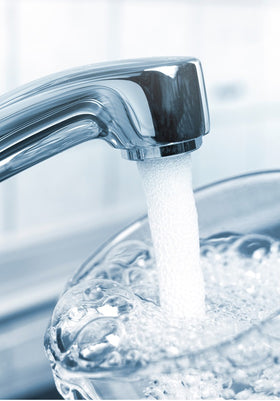
Is Reverse Osmosis Water Bad for Your Health?
Ever wondered if your crystal-clear reverse osmosis water is too clean for its own good? Short answer: nope—it’s not bad for your health. It removes the nasty stuff, but also takes some good minerals with it. In Reverse Osmosis FAQs: Answers to Common Questions, we break down how this affects your health—and what it means for countertop dispensers and reverse osmosis fans. Keep reading, hydration nerds!
Understanding RO Water and Health
You’ve probably seen those fancy filters promising to purify your water down to the last molecule. Reverse osmosis (RO) systems are some of the most popular out there. They strip out just about everything—including the good stuff. This has left some people asking: is it healthy to drink water that’s too pure? Let’s break down what’s really going on when you pour yourself a glass of RO water.
Mineral Content and Health
Here’s the deal. RO water is squeaky clean because it removes minerals like calcium, magnesium, and potassium—stuff your body actually needs. But before you start panic-buying spring water, consider this: the vast majority of your daily minerals come from your diet, not your drinking water. A slice of wholegrain toast, a handful of almonds, or a bowl of leafy greens gives you way more than a glass of tap water ever could. That said, if you’re relying solely on water for minerals… we need to talk about your meal plan.
Contaminant Removal and Safety
Where RO really shines is its ability to get rid of the nasties. We’re talking lead, chlorine, pesticides, bacteria, and even microplastics. For those in areas with questionable tap water, this can be a game-changer. It’s particularly beneficial for children or vulnerable adults, where exposure to heavy metals or chemicals could be risky. Clean water, fewer worries.
Scientific Evidence and Studies
We’ve heard the theories, now let’s talk science. What do studies say? Are the warnings legit or just modern-day water myths?
Research on RO Water and Health Effects
The World Health Organization (WHO) did a deep dive into RO water and concluded that, while it removes minerals, it’s highly effective at taking out dangerous contaminants. No clear evidence links RO water to any long-term health risks—so long as you’re eating a balanced diet. So if you’re not living off dry crackers and plain water, you’re probably fine.
Expert Opinions and Recommendations
British health authorities like the NHS also agree: your daily dose of minerals doesn’t come from your tap—it comes from what’s on your plate. Some nutritionists do suggest remineralising RO water if you’re keen on covering all bases. You can do this by using special cartridges or simply adding a pinch of mineral-rich salt to your bottle. But overall, the takeaway? RO water’s not the villain it’s made out to be.
Benefits of RO Water for Health
If you’ve ever been put off by the chemical taste of your tap water, you’ll love this part. RO water doesn’t just keep you safe—it can actually make your water taste better.
Removal of Harmful Substances
One of the best things about RO is what it leaves out. It kicks out 90–99% of nasties, depending on the system. That includes lead (nobody wants that in their tea), chlorine, fluoride (in excess), and even bacteria. If you live in an older home with ageing pipes or in an area with hard or questionable water, RO can be a real step up.
Ensuring Clean Drinking Water
Clean water is more than just safe—it’s refreshing. There’s something genuinely satisfying about a crisp, neutral-tasting glass of water.
Countertop Dispensers and Reverse Osmosis systems make this convenience even easier. Just pop a glass under, and voilà—pure hydration on tap.
Addressing Potential Concerns
Despite all the positives, RO isn’t without its critics. Let’s tackle the big questions people still have.
Mineral Loss and Dietary Balance
Yes, RO water lacks natural minerals. No, that doesn’t mean your body will suddenly start falling apart. Your body gets almost everything it needs from your meals. Unless your diet’s poor, the lack of minerals in your water won’t matter. Worried? Add a squeeze of lemon or a pinch of Himalayan salt to give your RO water a gentle mineral boost.
Long-Term Health Effects
There’s no solid proof that drinking RO water over the long term leads to negative health outcomes—again, assuming you’re eating properly. In fact, if anything, removing harmful chemicals and pollutants from your water can have long-term health benefits. Less exposure, fewer risks. The bottom line? It’s all about balance.
Ensuring Safe RO Water Consumption
Drinking RO water is one thing—maintaining the system that produces it is another. Here’s how to make sure your water stays top quality.
Proper System Maintenance
Like a car, your RO system needs a bit of TLC. Dirty or expired filters can make water worse, not better. Change filters regularly (every 6–12 months, depending on the model) and clean the system as recommended. A quick check-up every now and then saves a lot of trouble later.
Balanced Diet and Hydration
Let’s not overcomplicate things. Eat well, drink RO water, and keep things balanced. If you’re really concerned about missing minerals, you can buy mineral drops online or use a system that adds them back in. But for most people? A colourful plate and a clean glass are more than enough.
Conclusion: RO Water and Overall Health
So, what’s the final verdict? Should you rethink your filtered water habit?
Key Takeaways on Water Quality and Health
-
RO water is safe, clean, and effective at removing harmful contaminants.
-
While it strips out some minerals, your body mainly gets those from food.
-
Concerns about RO water causing deficiencies are largely unfounded.
-
Maintenance matters—look after your system, and it’ll look after you.
Final Recommendations
Reverse osmosis is a solid choice for anyone wanting peace of mind and pure hydration. If you're using Countertop Dispensers and Reverse Osmosis systems, you're already ahead of the curve. Keep your filters fresh, eat a balanced diet, and drink up—your body (and your taste buds) will thank you.
More Reverse Osmosis info we think you'll love
Are Reverse Osmosis Filters Interchangeable?
Are Reverse Osmosis Filters Universal?
Are Reverse Osmosis Systems Safe?
Are Reverse Osmosis Systems Worth It?
Can Reverse Osmosis Water Cause Constipation?
Can Reverse Osmosis Water Cause Diarrhoea?
Can Reverse Osmosis Water Dehydrate You?
Why is Reverse Osmosis Water Good for You?
Why do Reverse Osmosis Systems Waste Water?
Why Does My RO System Keep Draining?
Why is my Reverse Osmosis System Leaking?



Leave a comment